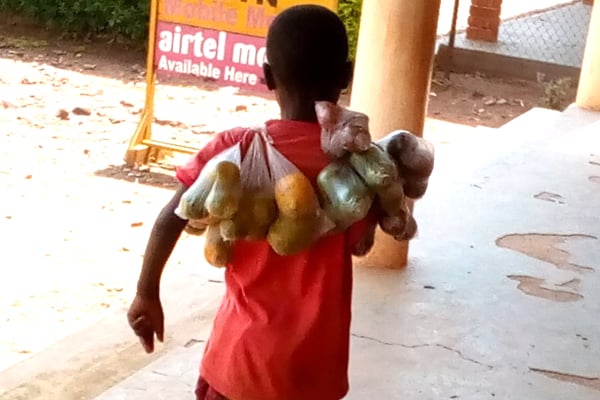Luweero teen pregnancies increase over street vending

A child vends fruits in Luweero Town Council yesterday. Child street vending is on the rise in the area. PHOTO/DAN WANDERA
What you need to know:
The police crime report for 2020 put Luweero among the 10 districts with the highest number of defilement cases. Luweero registered 174 defilement cases. Records at the District Probation Office indicate that 220 child abuse cases were registered between May and November 2020.
Street vending among children is not a new phenomenon in most urban centres in Uganda.
However, in Luweero District, the practice increased in 2020 as a result of the Covid-19 induced lockdown.
Many parents sent the children to the streets to sell foodstuffs after the temporal closure of businesses and schools over Covid-19.
However, many parents are regretting the decision after many youngsters, especially girls, fell victim to abusers.
Ms Elizabeth Mirembe Ssembatya, a single mother of six and resident of Kasoma Zone in Luweero Town Council, believes that her 13-year-old daughter, who is now pregnant, faces an uncertain future.
“I allowed my children to join the vending business since the family’s sole income generating business had been closed. I later regretted the decision after discovering that my daughter had been lured by a group of other girls into acts that led to a pregnancy,” she says
Ms Mirembe’s daughter was in Primary Six by the time the government announced the closure of schools and businesses in March last year.
Ms Aisha Nansubuga, a resident of Wampamba Zone in Wobulenzi Town Council, Luweero District, shares her sad story involving her 15-year- old daughter who recently gave birth to a baby boy by caesarean section at Kiwoko Hospital.
“My daughter had just joined Senior One when government closed schools. I allowed the girl to join her siblings in vending some foodstuffs since the family business had been closed. I cannot tell what happened, but the fact is that my daughter got pregnant because of bad company,” she says.
Ms Nansubuga further explains that her 16-year-old son has since refused to go back to school because he made some money from street vending during the lockdown.
Mr Paul Mukungu, the outgoing Luweero Town Council chairperson, says his efforts to discourage parents from letting children vend foodstuffs fell on deaf ears as many accused him of failing to understand their plight during the lockdown.
“Cases of children who were allegedly defiled and later got pregnant during the lockdown came to my office and as a political leader, I tried my best to talk to the parents, but some told me to mind my business,” he says.
Mr Mukungu explains that during the lockdown, many government offices were closed and operated with skeleton staff. Normal enforcement of particular guidelines was abandoned.
“This perhaps explains why the children poured onto the streets as vendors without any particular government office coming out to stop them. The situation was made worse by the fact that the parents were very bitter after government failed to come in with a rescue plan targeting food distribution to the vulnerable groups,” he adds.
Ms Joyce Namigadde, the Luweero District probation officer, says: “It is obvious that many children got introduced to an environment that was very compromising to their respective lives. We cannot rule out cases of children, whose rights were abused. Child labour is as an act of rights abuse.”
Stakeholders speak out
Mr John Ssegujja, the executive director of Community Development and Child Welfare Initiative (CODI), which operates in the districts of Nakaseke, Luweero and Nakasongola, blames the problem on natural trends that emerged as a result of the Covid -19 lockdown.
“When government announced the lockdown, nobody was prepared. The entire country was thrown into panic as businesses, transport and normal activities crumbled, but we should not run away from the fact that both government and the parents have the responsibility of protecting the children from acts that undermine their respective rights,” he says.
He reveals that between April and November last year, CODI registered more than 30 child abuse abuses.





